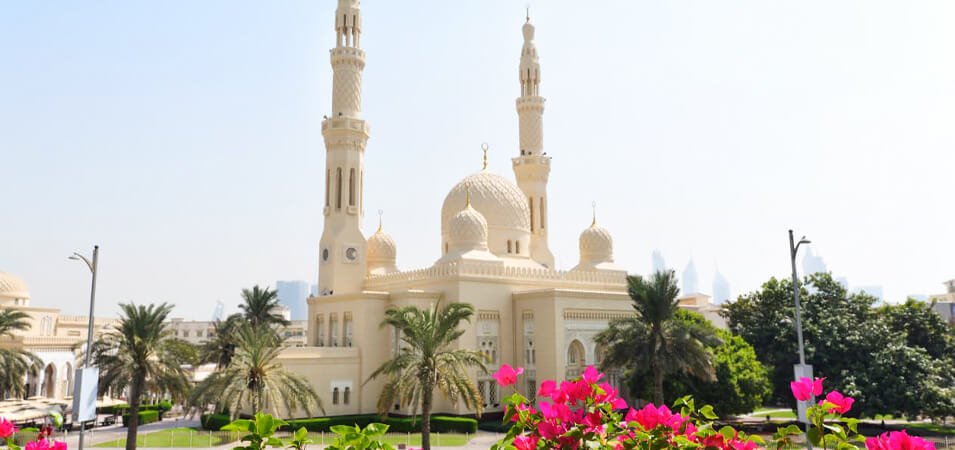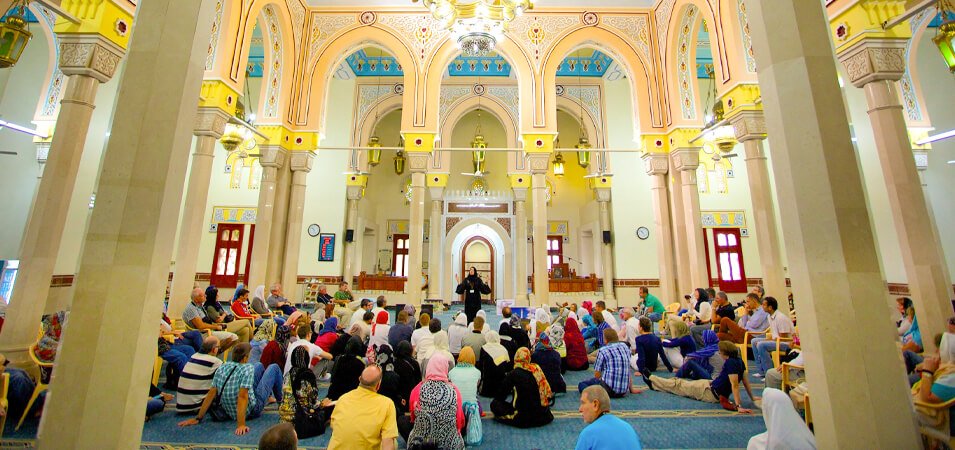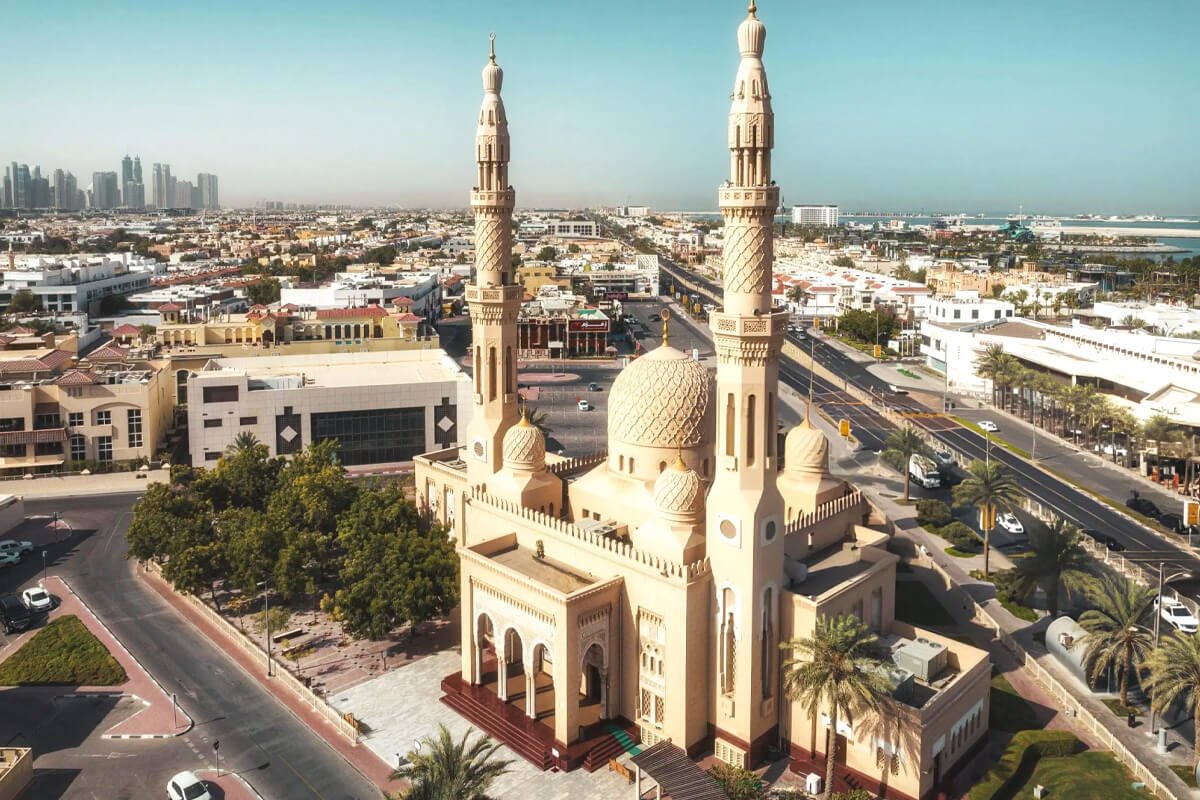Jumeirah Mosque, one of Dubai’s most iconic landmarks, stands as a testament to Islamic architecture and cultural heritage. Constructed in the traditional Fatimid style, it is renowned for its stunning design and welcoming ambiance.
Unlike many mosques, Jumeirah Mosque is open to non-Muslims, making it a unique destination for travelers eager to learn about Islamic culture and practices. This accessibility aligns with the mosque’s mission of fostering understanding and tolerance among different cultures and religions.
Visitors are often struck by the mosque’s intricate artistry and serene atmosphere, which provide a peaceful retreat from the bustling city. As we delve deeper into the history, architecture, and visitor experiences at Jumeirah Mosque, you’ll discover why it’s a must-visit on your next trip to the United Arab Emirates.
Historical Significance of Jumeirah Mosque
The history of Jumeirah Mosque is a rich tapestry that reflects the evolution of Dubai from a modest fishing village to a global metropolis. Completed in 1979, the mosque was built with the patronage of Sheikh Rashid bin Saeed Al Maktoum, the late ruler of Dubai.
Its construction during this period was part of a broader initiative to preserve and promote the region’s cultural and religious heritage amid rapid modernization. The mosque has since become a symbol of Dubai’s commitment to maintaining its Islamic roots while embracing global diversity.
Over the years, Jumeirah Mosque has not only served as a place of worship but also as a center for cultural exchange, offering educational tours and programs that demystify Islamic beliefs and practices. This historical context enriches the visitor experience, providing a deeper understanding of the mosque’s role in the community and its significance in the broader narrative of Dubai’s development.

Architectural Marvel of Jumeirah Mosque
Jumeirah Mosque is a masterpiece of Islamic architecture, showcasing the exquisite craftsmanship and artistry that define the Fatimid style. The mosque’s exterior is adorned with intricate carvings and geometric patterns, which are characteristic of this architectural tradition.
The two minarets, standing tall at the entrance, are particularly striking with their detailed design and towering presence. Inside, the mosque’s spacious prayer hall is equally impressive, featuring elegant arches, intricate tile work, and a beautifully designed mihrab (prayer niche) that indicates the direction of Mecca.
The use of natural light is another notable feature, with strategically placed windows that illuminate the interior and highlight the intricate details of the décor. This architectural splendor not only provides a visual feast for visitors but also creates a serene and contemplative environment that enhances the spiritual experience.
Cultural and Educational Tours at Jumeirah Mosque
Highlights of the ‘Open Doors, Open Minds’ Program:
- Daily Tours: Available from Saturday to Thursday, starting at 10:00 AM.
- Duration: Approximately 75 minutes, including a Q&A session.
- Dress Code: Modest attire required; traditional garments provided if necessary.
- Guides: Knowledgeable guides offer insights into Islamic culture and practices.
- Interactive: Visitors are encouraged to ask questions and engage in discussions.
The ‘Open Doors, Open Minds’ program at Jumeirah Mosque aims to promote understanding and respect among different cultures. The guided tours offer an in-depth look at Islamic traditions, architecture, and daily rituals.
These tours are particularly beneficial for non-Muslim visitors, providing a platform for learning and cultural exchange. By participating in these tours, travelers can gain a deeper appreciation of the mosque’s significance and the broader context of Islamic culture.
Spiritual Experience and Practices at Jumeirah Mosque
The spiritual experience at Jumeirah Mosque is deeply moving and provides visitors with a profound sense of peace and tranquility. As a place of worship, the mosque is a sanctuary for Muslims who come to perform their daily prayers and engage in communal worship.
The call to prayer, echoing through the minarets, sets a serene tone and invites worshippers to pause and reflect. Non-Muslim visitors are also welcome to observe these practices during the guided tours, offering them a glimpse into the spiritual life of the Muslim community.
The mosque’s serene ambiance, combined with the rhythmic recitation of prayers, creates a meditative atmosphere that is both calming and uplifting. This spiritual immersion, even for a short time, can be a transformative experience for many visitors, providing them with a deeper appreciation of Islamic faith and practices.
Visitor Information and Guidelines
To ensure a respectful and enriching visit, it’s important for travelers to be aware of the guidelines and etiquette observed at Jumeirah Mosque.
Dress Code:
- Women: Cover head, arms, and legs. Traditional garments available.
- Men: Wear long trousers and avoid sleeveless shirts.
Tour Schedule:
- Days: Saturday to Thursday
- Time: Tours start at 10:00 AM
- No Prior Booking Required: Arrive early to secure a spot.
Photography:
- Allowed in Designated Areas: Be mindful and respectful.
- Avoid Disrupting Worshippers: Maintain a quiet demeanor.
Practical Tips:
- Arrive Early: Enjoy the peaceful surroundings before the tour.
- Check the Official Website: For updates on schedules and special events.
These guidelines help ensure that all visitors have a respectful and meaningful experience at the mosque.
The Role of Jumeirah Mosque in Promoting Cultural Understanding
In today’s globalized world, fostering cultural understanding and mutual respect is more important than ever. Jumeirah Mosque plays a vital role in this regard, serving as a bridge between different cultures and communities.
Through its educational tours and outreach programs, the mosque promotes dialogue and dispels stereotypes, helping visitors from diverse backgrounds gain a more nuanced understanding of Islam. This mission of cultural diplomacy is particularly significant in a cosmopolitan city like Dubai, where people from all over the world live and work together.
By opening its doors to non-Muslims, Jumeirah Mosque exemplifies the principles of tolerance and inclusivity that are essential for peaceful coexistence. This role as a cultural ambassador not only benefits the local community but also enhances the experience of international visitors, contributing to a more harmonious and interconnected world.

Planning Your Visit to Jumeirah Mosque
When planning a visit to Jumeirah Mosque, it’s helpful to consider the best times to go, nearby attractions, and practical tips for a smooth experience don’t miss it with Dubai Go tours.
Best Times to Visit:
- Morning Tours: Ideal for a tranquil experience.
- Check the Schedule: Visit the mosque’s official website for updates.
Nearby Attractions:
- Jumeirah Beach: Relax by the seaside after your visit.
- Dubai Canal: Enjoy a scenic walk along the canal.
Practical Tips:
- Arrive Early: Secure your spot for the guided tour.
- Dress Modestly: Adhere to the dress code for a respectful visit.
- Photography: Take advantage of the soft morning or late afternoon light for the best photos.
By planning ahead, travelers can ensure a memorable and enriching visit to this iconic landmark.
Jumeirah Mosque and the Broader Context of Islamic Heritage in Dubai
Jumeirah Mosque is an integral part of Dubai’s rich Islamic heritage, which is evident in the city’s numerous other mosques and cultural sites. Exploring these sites provides a comprehensive understanding of the region’s religious and cultural history.
Notable Mosques in Dubai:
- Grand Mosque: Known for its impressive minaret.
- Al Farooq Omar Bin Al Khattab Mosque: Inspired by the Blue Mosque in Istanbul.
- Al Noor Mosque: Features stunning modern Islamic architecture.
Cultural Centers:
- Sheikh Mohammed Centre for Cultural Understanding: Offers programs and events to learn about local traditions.
- Dubai Museum: Located in Al Fahidi Fort, provides insights into the city’s history.
By visiting Jumeirah Mosque as part of a broader exploration of Dubai’s Islamic heritage, travelers can gain a deeper appreciation of the city’s historical and cultural landscape.
Conclusion
In conclusion, Jumeirah Mosque stands out as a beacon of cultural and religious significance in Dubai. Its stunning architecture, welcoming atmosphere, and commitment to education make it a must-visit for travelers.
Whether you are interested in history, architecture, or simply seeking a peaceful retreat, Jumeirah Mosque offers a unique and enriching experience. For those planning trips to Egypt, a visit to this mosque can also provide valuable context and insight into the Islamic heritage that they will encounter throughout their journey.
As you plan your travels, consider making Jumeirah Mosque a part of your itinerary to enhance your understanding and appreciation of the rich cultural tapestry that defines the Islamic world.
